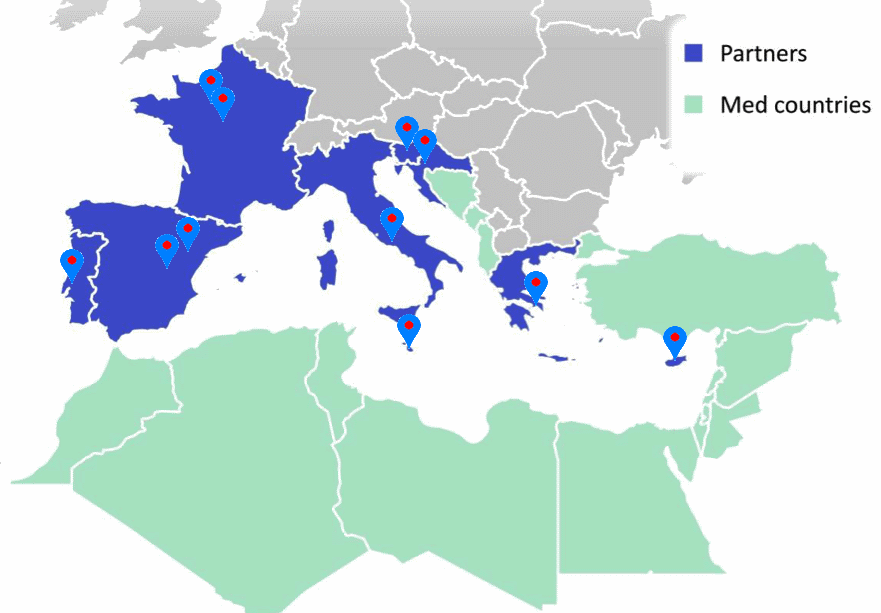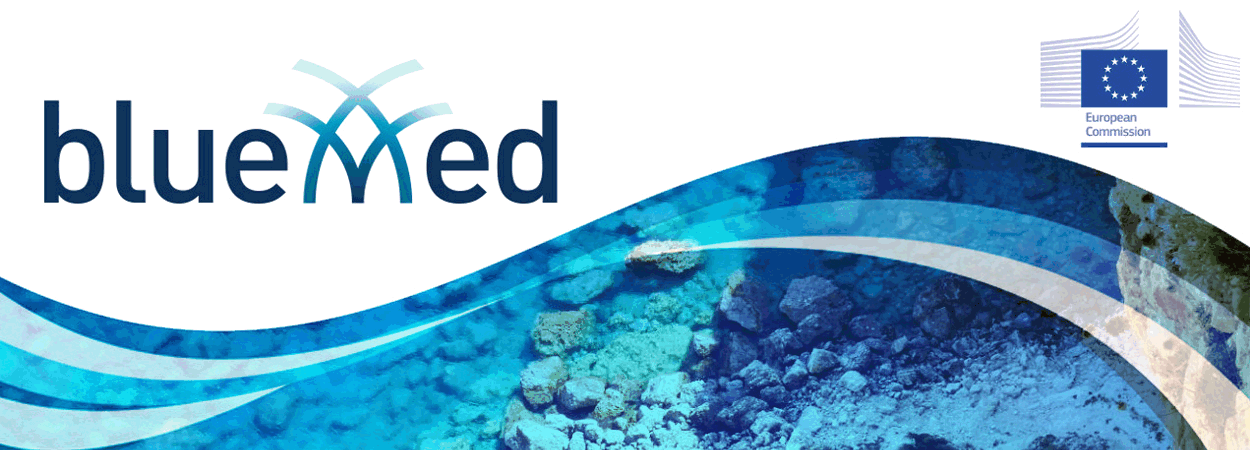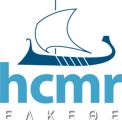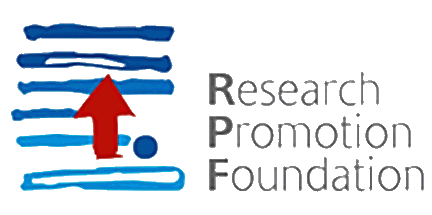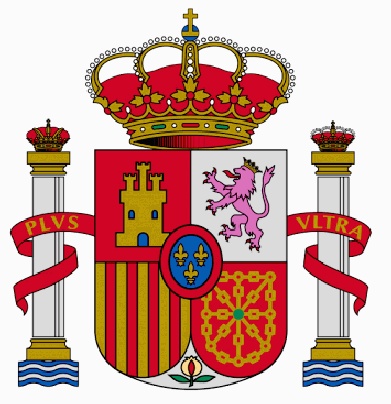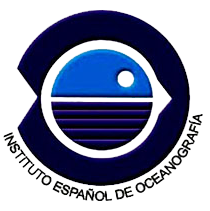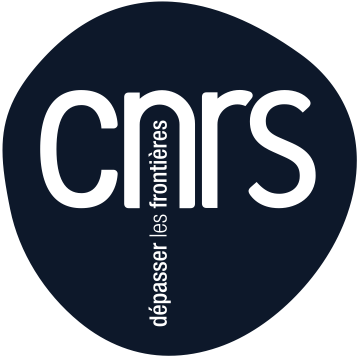|
BLUEMED
FOUNDATION - HOME - A-Z INDEX
According to their website the BLUEMED project is a Coordination and Support Action funded by the European Commission within the H2020 framework programme with 3 M€, aimed at supporting the implementation of the BLUEMED Initiative.
The region’s geopolitical complexity may represent a constraint on implementing framework conditions favourable to blue economic growth. Joint efforts are required to successfully address present and future challenges. A global perspective, along with more vigorous transnational and international cooperation, is essential to implement effectively and efficiently tailored actions that are conducive to safe, secure and sustainable development for all.
PARTNERS -
A map showing the location of BlueMed countries bordering the Mediterranean
Sea.
BLUEMED is the result of joint efforts by Cyprus, Croatia, France, Greece, Italy, Malta, Portugal, Slovenia and Spain, with the support of the European Commission. It started in 2014 during the Italian Presidency of the Council of the European Union and, thanks to the joint effort of EU-Member States with the support of the EC, produced in 18 months a Vision document and the BLUEMED Strategic Research and Innovation Agenda (SRIA), taking into account the work already done at national, regional and EU level. The BLUEMED SRIA was formally endorsed through the Venice Declaration, signed on 16 October 2015.
The BLUEMED initiative offers a shared strategic framework for working towards a healthy, productive and resilient Mediterranean Sea that is better known and valued. It is designed to tap the full potential of the marine and maritime sectors, structuring transnational cooperation to create new ‘blue’ jobs and to promote and improve social wellbeing, sustainable prosperity and the environmental status of the region and its surroundings.
Climate change, growing maritime traffic and pollution, overexploitation of fish stocks and invasions of alien species are among the stressors placing the region at risk. At the same time, the Mediterranean’s unique features provide major local opportunities for blue growth and jobs, ranging from fisheries to tourism.
Among the seas of Europe, the Mediterranean has no match as regards biodiversity and the links between human activities and environmental characteristics. It is changing fast in response to both natural and anthropogenic pressures.
WHY
BLUEMED?
UNIVERSITY OF MALTA 18-19- APRIL 2017
Blue Growth in the Mediterranean was on the highlights in a two-day conference held on 18/19 April under the auspices of the Maltese Presidency of the Council of the European Union. Presentations on various projects and existing best practices that promote the BLUEMED agenda were delivered by invited experts, and set the scene on what is anticipated to be a strong push for research and innovation in favour of blue jobs and growth in the maritime sector in the region.
Prof. Aldo Drago, Head of the Physical Oceanography Research Group (ex PO-Unit) within the Department of Geosciences, made two presentations on international initiatives in which the University of Malta is a key player. The Copernicus Marine Environment Monitoring Service (CMEMS) was presented on behalf of MERCATOR OCEAN, the French centre for analysis and forecasting of the global ocean, and the entity entrusted by the European Commission to implement and operate the service. Dedicated to ocean observation and monitoring, CMEMS is one of the six services delivered in the Copernicus programme, creating value by distributing regular and systematic core reference information on the state of the global oceans and the European regional seas. The service is designed to serve many public, commercial and scientific purposes including major EU policies, combating pollution, protection of marine species, maritime safety and routing, sustainable exploitation of ocean resources, marine energy resources, climate monitoring and hurricane forecasting. It also aims at increasing general public awareness by better informing European citizens about ocean-related issues.
The PO-Res. Grp. are a historical partner in the MyOcean series of projects that led to CMEMS, and is a champion user of CMEMS data as an intermediate user to downscale forecasts to the shelf and coastal scales. It also acts as the local broker to promote the uptake of CMEMS data by Maltese stakeholders. In particular, the M.Sc. course on Applied Oceanography run by the PO-Res. Grp. is a showcase resource to empower future marine professionals with skills in operational oceanography and in the intelligent derivation of added value and knowledge from marine data for smart and innovative applications.
In the other intervention Prof. Drago presented the extended Adriatic Ionian Ocean Observing System (eAIROOS) proposal to set up a regional marine observation network in the macro-region including Malta and Tunisia. The policy brief on eAIROOS prepared within the RITMARE project funded by the Italian Ministry highlights the targets of such a system as a framework for the sustained, coordinated and routine acquisition, sharing and elaboration of relevant marine data as a backbone to the Blue Economy. Data platforms feeding the production chains of integrated services covering the full spectrum of users are increasingly becoming key assets for economic growth and benefits while addressing the exigent needs for safeguarding the environment and securing protection against hazards.
The presentation served to launch the initiative within high profile circles. The Maltese EU Presidency provides the ideal setting to promote eAIROOS as an initiative promoted by Malta and following the trail of the BlueMed initiative which started under the Italian EU presidency. Emphasis was made on how eAIROOS intends to strengthen links with industry, businesses and entrepreneurs to exploit marine data for innovative smart applications, generate a multiplier effect through win-win data usages and enhancing the marine knowledge value chain.
Prof. Alan Deidun delivered a presentation on the MED-JELLYRISK project and another on the SeaofSkills project. MED-JELLYRISK was funded within the framework of ENPI CBCMED and ran between 2013 and 2015. Within this project, a number of mitigation measures to assist coastal stakeholders address the increasing phenomenon of jellyfish blooms were designed, including a jellyfish dispersion model and the deployment of anti-jellyfish nets, as well as a number of citizen science and public awareness tools, including a smart phone app, seaside boards and jellyfish identification manuals, factsheets and sting treatment booklets. The project website is still operational and can be consulted through www.jellyrisk.eu
SeaofSkills is funded under Erasmus+ and has the ultimate aim of delivering vocational educational material for fishers in Malta, Greece and Turkey. The project, which runs till August of this year, has organised a number of training and multiplier events within the participating countries with the aim of optimising the training material for fishers through liaison with stakeholders, including national fisheries, environmental and transport authorities as well as vocational education and training providers. The training material is organised along five chapters, including safety at sea, technology on fishing boats, cold chain management, business model development and the application of ecosystem-based management to fisheries. Further information about the project can be gleaned from www.seaofskills.eu
The project BioDiValue was presented by Audrey Zammit, also from the Physical Oceanography Research Group. This project, which was executed between 2012 and 2015, highlighted the influence of marine traffic on biodiversity in the marine environment. A network of AIS antennae was set up to monitor the movement of shipping vessels in the area around the islands of Malta and Sicily. An extensive study of the sediments in selected Sicilian (Augusta, Siracusa and Lampedusa) and Maltese (Grand Harbour and Marsaxlokk Freeport) harbours was also carried out.
PROJECT
AIMS - The overall objective is to foster the development of Blue Growth
in the Mediterranean
Sea.
BLUEMED PARTNERS
BLUEMED CONTACTS & REFERENCE
Consiglio Nazionale delle Ricerche https://www.um.edu.mt/newspoint/news/features/2017/04/universityofmaltaatbluemedconference http://www.dgpm.mam.gov.pt/ http://www.izor.hr/web/guest/home http://ec.europa.eu/dgs/environment/index_en.htm http://www.bluemed-project.eu/ https://www.facebook.com/BlueMedProject/
This website is provided on a free basis as a public information service. Copyright © Cleaner Oceans Foundation Ltd (COFL) (Company No: 4674774) 2017. Solar Studios, BN271RF, United Kingdom. COFL is a charity without share capital.
|
